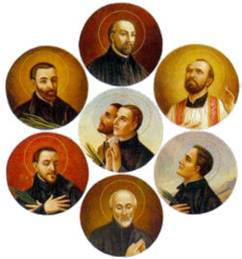OCTOBER 19 - ST. ISAAC JOGUES, ST. JOHN DE BREBEUF AND COMPANIONS

More than three hundred years ago, six Jesuit priests and two holy laymen, all from France, died as martyrs in North America. These eight men were some of the bravest and most daring missionaries in the New World.
They put their own lives in danger to bring Jesus to the Red Indian people. They worked very hard and were able to convert many of the Huron tribe. But the Iroquois, bitter enemies of the Hurons, put them all to death.
St. Isaac Jogues was a Jesuit priest who was sent as a missionary to New France in Canada. This was a difficult job. Not only were the living conditions hard, but the locals blamed the “Blackrobes” for any disease, bad-luck or other problems they had. Then the Mohawks captured and made him suffer for thirteen months. During that time, he tried to teach the Faith to anyone who would listen. When he was set free by the Dutch, he went back to France to get better, but as soon as he could, he returned to North America to continue his work. Father Jogues finally had his head chopped off with a tomahawk (large axe) by the Bear Clan of the Mohawks.
When St. John de Brebeuf was in France, he had tuberculosis and was so sick that he could not teach much. But then he too was sent as a missionary to New France. There the harsh and hearty climate agreed with him so well that the Native Indians called him Echon or load-bearer. He was so huge that they were afraid to share a canoe with him as they feared it might sink. Although he was a famous professor of Theology in France, it took him a long time to learn the Huron language. Finally he was able to write a catechism in Huron for the native people. He also wrote a French-Huron dictionary and a list of Instructionsfor other Jesuit Missionaries on how to work well with the Indians. He was a wonderful and brave apostle of Jesus and his courage amazed the fierce Iroquois as they tortured him to death.
St. Gabriel Lallemont was also tortured to death with St. John de Brebeuf.
St. Anthony Daniel had just finished celebrating Mass for his Huron converts (those who had become Christians) when the Iroquois attacked the village. The Christian Indians begged him to try and escape. But Father Daniel stayed. He wanted to help all those who were crying to him for Baptism before they would be killed. The Iroquois burned him to death in his little chapel.
St. Charles Garnier was shot by an Iroquois musket during a surprise attack, but he still tried to crawl to help a dying man. When the Iroquois saw this they angrily killed him with a hatchet blow.
Father Noel Chabenel found the life of a missionary very hard, but had made a promise to stay in North America. He was killed by a Huron traitor using a tomahawk.
The two lay helpers, Rene Goupil and John Lalande, were also both killed with tomahawks.
These brave martyrs were heroes of Christ and gave their lives for the native people of North America so that they too could know the love and friendship of Jesus. After their death, new missionaries were able to convert almost every tribe that the martyrs had known.
1. You must love these Hurons as brothers because Jesus paid for their lives by his blood, as he did for ours.
2. You must never keep the Indians waiting when it is time to leave on a journey.
3. Carry a tinder-box or piece of burning-glass, or both, to make fire for them during the day for smoking, and in the evening to light the bonfire at camp; these little services win their hearts.
4. Try to eat the little food they offer you, and eat all you can, for you may not eat again for hours.
5. Eat as soon as day breaks (when the sun rises), for Indians when traveling, eat only at the rising and the setting of the sun.
6. Be quick to get in and out of the canoes and do not carry any water or sand when you get in.
7. Try not to be troublesome to the Indians.
8. Do not ask many questions; silence is golden.
9. Bear with their faults, and you must try always to appear cheerful.
10. Carry folding knives and some plain and fancy beads with which to buy fish and things you need from the other tribes you visit. Tell your Indian companions at the very beginning that here is something with which to buy fish and treat them to the food.
11. Do not be formal with the Indians.
12. Do not begin to paddle unless you always intend to paddle.
13. The Indians will always remember how you handled your first trip.
14. Always show any other Indians you meet on the way a cheerful face and show them that you willingly accept the tiring journey.
